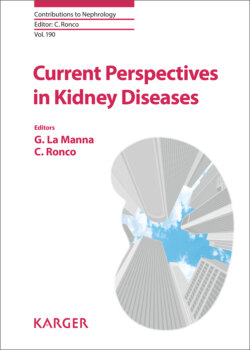Читать книгу Current Perspectives in Kidney Diseases - Группа авторов - Страница 17
На сайте Литреса книга снята с продажи.
Timing
ОглавлениеNowadays, there is no consensus on the optimal timing of RRT initiation. Recent studies showed that an excessive delay in RRT start is associated with higher mortality rates and with the worsening of renal function. Retrospective and observational studies suggested that patients with S-AKI treated with early RRT (defined as urea <35.7 mmol/L, start of RRT ≤24 h after the diagnosis of sepsis or by time from ICU admission/initiation of vasopressor infusion) have better survival [36–38]. Also, recent reviews [40] and a meta-analysis [41] showed that earlier start of RRT in critically ill patients with AKI (before the onset of complications and of fluid overload) may have a beneficial impact on survival; however, the same authors emphasized that this conclusion is based on heterogeneous studies that differed in their definition of early and late initiation. Another retrospective review revealed no significant clinical benefit of early RRT initiation in patients presenting with septic shock and AKI [42]. Furthermore, the recent trial from AKIKI group [43] did not show any significant difference in mortality with delayed or early RRT start. The forthcoming Initiation of Dialysis Early versus Late in the Intensive Care Unit study (IDEAL-ICU) will probably help in defining the optimal timing of RRT in S-AKI. Meanwhile, it is acceptable to start RRT at RIFLE injury/failure level as suggested by the Kidney Disease Improving Global Outcomes (KDIGO) guidelines [44]; early initiation of RRT is indicated when fluid overload is excessive or refractory to diuretics [45].
